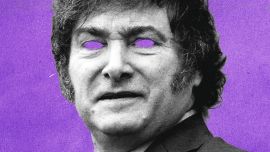It had to happen some time – with the prominence of the United States in recent news items (the weekend visit of Secretary of State Rex Tillerson and the blackest Monday of them all on Wall Street) even within a strictly Argentine focus, Dr Hale is not asking me this week, he’s telling me.
He writes:
“From my New England viewpoint, what clearer demonstration of cause and effect could there be than the result of the Super Bowl being followed the very next day by an all-time record crash on Wall Street? Still cannot quite believe that the multi-champ New England Patriots have been dethroned – very temporarily, I’m sure—by the Philadelphia Eagles (did not W.C. Fields – born and buried in that city – insist on his tombstone reading: “I’d rather be dead than in Philadelphia”?). At the same time I must secretly confess that I vastly prefer your soccer to our American football – I wholly subscribe to George Will’s verdict on the latter sport as combining the two worst aspects of US life: violence and committees.
“Yet since I’m not only a New England patriot but also an economist. I suppose I’m expected to produce some more directly related antecedents to Monday’s crash. So how about Jerome (Jay) Powell replacing Janet Yellen at the helm of the Federal Reserve on the very last working day before the crash? The Fed is not my comfort zone because you might remember me predicting very confidently 15 editions ago that The Donald would be plonking John Taylor at its head (Powell stands somewhere midway between Yellen and Taylor on the soft to hard money scales). I note that the names Janet, Jerome and John all begin with the same letter, which stands for ‘genius’ according to Donald J. Trump (in fairness, this is more one of the things said about Trump than by Trump). But in general I find the influence of Fed chairs (even the legendary Alan Greenspan, in charge for almost two decades) overrated – it’s really the markets which set the rates.
“So is linking Powell to the big crash as tongue in cheek as the Super Bowl or is it at all serious? The answer to this question largely hinges on whether the crisis should be seen as responding to the past or to the future. Was Monday’s collapse a correction of an excessively exuberant response to Trump’s tax cuts (a correction itself corrected the following day when half the losses were retrieved) or was it looking ahead to higher interest rates under Powell as the quantitative easing of the last decade bites the dust for good? And should the fact that the fundamentals of the US economy are in place (growth reflected both in lower unemployment and real wage gains) reassure us against Wall Street pyrotechnics or do these strong fundamentals ensure higher interest rates to guard against overheating?
“How black was Black Monday? Dow Jones dropped 1,175 points (almost 1,600 at one stage), thus far outstripping the 508 points of the previous Black Monday in 1987. But this four-digit plunge only represented 4.6 percent of total share value as against almost a quarter in 1987. The Wall Street Crash of 1929 is widely believed to be the most devastating stock market fall in history and is certainly the most famous but ranks only third – a 13 percent contraction of the market not only features well behind 1987 (22.6 percent) but even more behind 1914 (24.4 percent) when the outbreak of World War I shattered world trade.
“Hard to tell where today’s Wall Street is heading but how important have its previous dramas proved in economic history since here we have the advantage of hindsight? The Black Tuesday of 1929 is an interesting example – there is a widespread US myth that the Great Depression of the 1930s was triggered by the Wall Street crash just two months before the start of that decade and solved by the New Deal when in fact it was really started by the Smoot-Hawley tariffs of 1930 destroying two-thirds of world trade in the next three years and ended by World War II (US unemployment was still 19 percent in 1938). The Black Monday of 1987 was cataclysmic at the time but neither it nor the increasingly evident fallacies of the supply-side theories behind Reaganomics (‘I never worry about the deficit – it’s big enough to look after itself’) prevented the elder George Bush from succeeding Ronald Reagan pretty smoothly in 1988. Nevertheless, the slogan ‘it’s the economy, stupid’ in the following election took Bill Clinton to the White House – possibly the most fiscally and economically successful presidency in US history but strangely leaving one of the smallest footprints.
“And what should we expect now on the basis of history? It really could go either way. It could simply be an unusually large correction of an unusually long period of expansion with several months of bonanza inevitably leading to profit-taking and just some smaller outbursts of volatility to follow. Or this could be akin to the sub-prime stock market jitters of 2006 which heralded the global meltdown of 2008-9 and years of stagnation.
“I may not get a reply if I don’t ask you anything so do you have any comments on all this, what was the impact down there and what can you tell me about the visit of Rex Tillerson (a Texas oilman rather than a diplomat who largely clinched the portfolio on the back of his Russian links and who is unlikely to stay too long, given the current shambles of US foreign policy)?”
My reply:
“Why should I force myself when you seem to know everything? Argentine shares and bonds obviously took a hit along with everybody else and Argentine companies might now feel disinclined to follow the example of Corporación América, which launched its IPO and rang the bell on Wall Street on the first day of the month. As for Tillerson (his focus on Americas and G20 summitry rather than bilateral ties with Argentina), I have the impression that if anything important emerged from his trip, it would have come from meetings beyond his official sessions with President Mauricio Macri and Foreign Minister Jorge Faurie so I’m ignorant there. Interesting that you single out 1914 not 1929 as the worst stock market year – exactly the same for 1914 here when everyone imagines 2001- 2002 to have the worst economic data. But it’s incredibly hot here, Dr Hale, with yellow and orange alerts – if you don’t make me work harder, I won’t.”























Comments